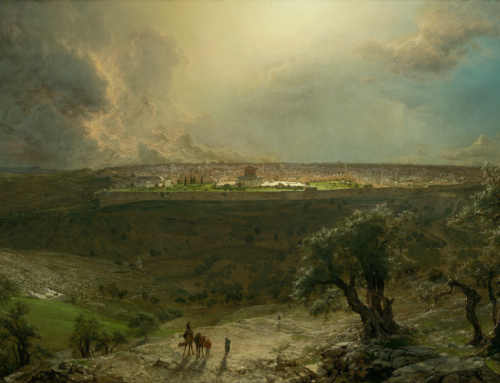The book of Revelation ends with a vision: “Then the angel showed me the river of the water of life, bright as crystal, flowing from the throne of God and of the Lamb through the middle of the street of the city. On either side of the river is the tree of life with its twelve kinds of fruit, producing its fruit each month; and the leaves of the tree are for the healing of the nations” (Rev 22:1–2).
The Church is the tree of life and the martyrs are its leaves. Leaves on a tree do not feed themselves; they feed the tree. They take in the light of the sun, turn it into something sweet and good for the tree, and, when their life is complete, they fall to the ground, continuing to feed the tree in a hidden way through the roots. Similarly, the martyrs stand in the light of Christ while they live, strengthening the Church through their faith, and they continue to do so in a hidden way after they fall.
Leaves do not complain or rebel when their time comes. They silently fall from the tree, just as the Lamb of God went silently to his death on the cross. The Prophet Isaiah says of the suffering servant: “He was oppressed, and he was afflicted, yet he did not open his mouth; like a lamb that is led to the slaughter, and like a sheep that before its shearers is silent, so he did not open his mouth” (Isa 53:7). Likewise, the martyrs of every age quietly trust in the Lord amid persecution, offering their lives in the greatest act of charity possible.
The blood of the martyrs is for the healing of the nations. We often hear that the blood of the martyrs is the seed of the Church. This is true: the Church has always grown stronger and healthier after it has faced trial and tribulation. This benefits not only the Church herself but also the nations that persecute her. After Christ gave up his life on the cross, the Roman soldier standing by the cross, who had just nailed him to the cross, proclaimed that “This man was the Son of God” (Mark 15:39). All around the world, from Uganda to Vietnam, nations have come to Christ after the silent self-offering of the martyrs.
Although the vast majority of us will not be called to shed our blood for Christ, each and every one of us is called to conform our lives to the Truth that assumed flesh and blood for our sake. This will necessarily draw the attention and ire of the world down upon us because “[we] do not belong to the world any more than [Jesus] belongs to the world” (John 17:14). Even our own nation, which is in such need of healing, will reject us.
This is where the silent witness, the silent martyrdom, of the Christian comes in. We too are called to share in the redemptive suffering of the Lamb in various ways. One ancient tradition names different colors of martyrs: different colors of leaves that fall and heal the nations.
When persecutions large or (more likely) small come our way, we can be silent as leaves before those who persecute us, trusting in the Lord. This is because it is not through our earthly success that hearts are converted or the nation healed, but through the victory the Lamb of God has already won. We may not ever see it in this life, but, if our sufferings are silently joined to those of the Lamb, God can use them for the healing of the nations—including the healing of our own.
✠
Photo by Faye Cornish on Unsplash







